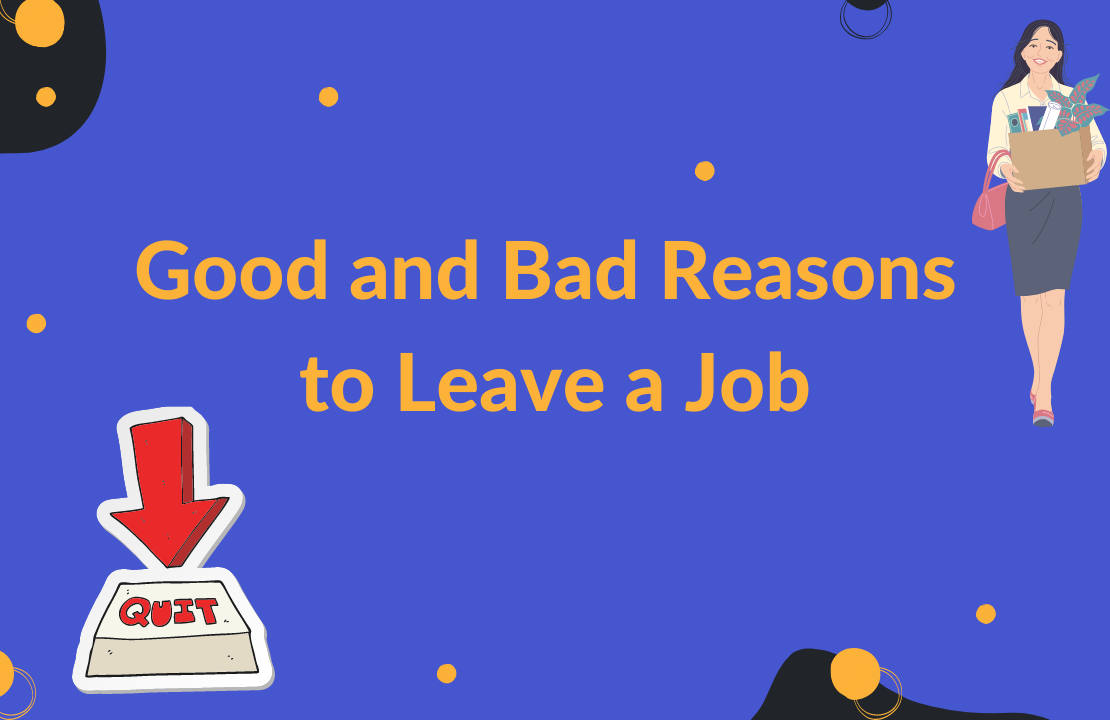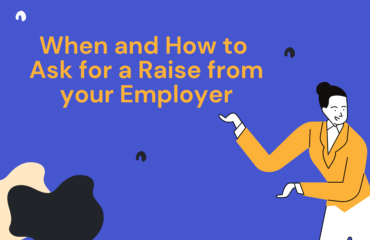Table of Contents
Leaving a job is a crucial decision that depends on a number of factors. On average, a job search takes five to six months. Hence, it is important to be completely sure about switching careers. While there are some legit reasons to move to a new career, some people end up leaving their jobs for the wrong reasons. This increases their chances of falling prey to job search anxiety, continuous unemployment, and even dissatisfaction at the new job. Thus, in this article, we will discuss some good and bad reasons to leave your job so that you don’t leave your current role for the wrong reasons.
Good reasons to leave your job
1) You are looking for career growth
Career advancement is essential for any employee. It could come in many forms, such as a higher salary, senior title, leadership role, more development opportunities, or even higher satisfaction with your work. However, not all roles provide you with this opportunity. So if you are looking to grow in your career but haven’t had the opportunity to do so, it may be the right decision for you to look for a different job. Some signs to confirm this are:
- You have been passed over for promotion multiple times
- Your salary hasn’t changed in a long time
- You have been doing the same tasks ever since you joined the company
- You haven’t acquired and utilized any new skills lately
- You don’t feel challenged in your current role
- Your performance is deteriorating
2) You are facing health issues due to your job
Long hours, conflict with colleagues or bosses, job demand, and job insecurity are some common reasons that have been known to create stress in the workplace. However, there may be two types of stress that may arise in such situations. First, eustress or positive stress allows employees to perform better while deriving a higher level of satisfaction and fulfillment. The other is the distress that directly impacts an employee’s health negatively.
Poor working conditions have been known to affect employees’ health. Professionals with low satisfaction at work experience depression, sleep deprivation, anxiety, alcoholism, and hypertension. This is not limited to just mental health. Many employees also face physical issues such as cardiovascular complications, diabetes, and stroke. Hence, if you are experiencing distress that is affecting your mental and physical health adversely, it is a sign that you need to start looking for another role. If you believe your health has been severely impacted, we would even recommend you take a break if feasible before looking for another job.
3) You have some personal reasons
Sometimes you can love your current job, have amazing colleagues and good pay, yet are required to make a switch. This is mostly due to some personal reasons such as family/spouse moving to a different location, having to be a stay-at-home parent, staying at home due to a family member’s illness or simply spending time with family. While there could be many other reasons, quitting a job due to personal reasons is totally valid and justified. At times, you may feel that it was an unnecessary move, but it is essential to remember that you may always find another job. However, the time missed with your friends and family is irreplaceable. So if you are someone wanting to leave your job due to a personal reason, we encourage you to do so and put your foot back in the labor market when you are ready again.
4) Your work culture is toxic
A toxic work culture not only impacts your productivity and performance but also affects your emotional health. In fact, three out of ten people have reported that their work culture makes them irritable at home, directly impacting their personal lives. An employee in a toxic work environment can be simply considered as a plant without sufficient sunlight, water, and air. Eventually, we know what happens to this plant. About one out of five people and six out of ten people have reported leaving their previous jobs due to toxic culture and poor managers, respectively. So before a toxic work culture gets to you, it is better to move out and look for a company that truly cares about you. Some signs of a toxic workplace to look out for are:
- Workplace politics
- Lethargic employees
- Stressful work hours
- No workplace initiatives
- Public criticism of employees
- Poor communication
- Complex hierarchy
- High employee turnover
- Neglected employee health
5) You found your dream role
Finding their dream job is the end goal for many people. However, it comes with a lot of struggle, effort, and time. While there may be a few who are lucky enough to get their dream jobs in a go, there are some who work towards it for years before finally landing it. In fact, about four in five Americans say that they don’t have their dream job yet. So if you are one of those lucky people who found their dream jobs, it is definitely worth leaving your current role for it. However, quit your current job only when you have an offer letter.
At an early stage where you have only identified your dream role, do some research and prepare your application accordingly. Make sure you customize your resume and cover letter, update your LinkedIn profile if required, and reach out to potential people from the company who can support your application. Additionally, we suggest keeping it quiet at this stage to avoid any sort of discrimination and cynicism at your workplace. Once you have a job offer, you can resign from your current role gratefully.
Bad reasons to leave your job
1) Your family thinks you should change your job
Your job is about your interests, experience, and expertise. So when you feel dissatisfied at work and want to switch to a different career, it is valid. However, if you want to move to a different role or employer because your family thinks you should, you definitely need to think twice. An external party like your friends or family often judges your job by salary, employer brand, or even location. This may lead to them having a different perception of your job. If you are being asked to look for a different role because of this perception while you are happy at work, you most certainly don’t have to leave your current job.
2) You feel your friends are doing better than you
The digital era that we are part of allows a lot of us to show off our lavish lifestyle online. However, the reality may be different. Sadly, a small chunk of life witnessed online is enough for many of us to judge ourselves and our achievements. If you feel that your friends and acquaintances are doing better than you and so you should start looking for a ‘better’ job, think if it is a wise move. While your feelings may be valid, a rushed decision may do you more harm than good.
Start looking for a new role when your current job has stopped challenging you or has left no scope for you to grow. If you want to switch jobs to compete with your friends doing well, let us reassure you that you are doing great and are exactly where you need to be. It has been rightly said, “Everyone Has a Different Clock: Wait for Your Time”. Focus on your personal growth, feel happy about your friends that are doing well, and move to a new career only when you genuinely feel the need to. If you are having feelings of insecurity, we strongly recommend speaking with a close friend or family member or seeking professional help from a career coach or a mentor to help you understand your goals better.
3) Your job is not up to your “status”
Many of us are conditioned to judge someone’s status by their income and job level. These unhealthy standards of judgment often allow us to underestimate our potential and de-value our jobs. Status and standards are created by society and people’s perceptions. Thus, wanting to leave your current job only because it reflects a lower status is not a good idea. If you like your job and are growing, avoid thinking about any external factors that may result in negativity. What really matters is how happy and satisfied you are in the role. Think about moving to a new role or industry when you are ready to explore something new. Until then, enjoy what you have and don’t let anything impact your healthy relationship with your job and employer.
4) Your performance feedback hasn’t been great
Feedback is an important aspect of any job. Consistent and good feedback can be a great motivator for employees. On the other hand, poor and critical feedback may hinder your positive mindset and motivation to work. In fact, consistently receiving poor feedback may result in you thinking about looking at new roles too. While we completely understand this urge to give up, there may be better solutions to help you instead of quitting your job role. If your recent performance feedback hasn’t been at par with your expectations, consider the following:
- Identify what is not working in your favor.
- Speak to your manager about your problems and discuss ways to overcome them.
- Share your thoughts with a close friend or colleague and let them know how you feel.
- Set clear goals and prepare a development plan to work on things that need improvement.
- Ask for feedback more regularly to assess the changes.
Career changes are time-taking and require a lot of effort from you. While exploring and looking for options is always a good idea, we encourage you to understand if you really want to switch careers right now. When your need and want to change your current job aren’t high, your job search will not be effective. In turn, this will impact your overall morale. Hence, assess your situation and see if you can find a solution to your current problem. Quit your job only when you are 100% sure about your desire to leave and look for another venture.











